Research purpose
This speculative design side-project was made for a Swiss health insurance company, with the intent to explore possible futures as scenarios, extending on the three horizon UX strategy developed for the company.
In particular, the idea was to explore the third horizon, the one surfacing a lot of unknown-unknowns, which focuses on some societal changes in perception of health-related topics and the role of insurances in the face of the following factors:
- Climate change and its effects in Europe
- An ageing population in Europe and more specifically in Switzerland
- The evolution of expectations regarding work-life balance, mainly catalysed by new opportunities around flexible and/or reduced working hours and partial or full remote home office.
World-building
Health-related perception will be less and less limited to medical conditions only, and become more and more related to "lifestyle" and environmental impact. Your consumption choices and your behaviours in people's life will be perceived to have even greater impact on health and environment, and that will be a greater significant marker of social status than owning material things (as it is today).
Similarly, these choices and behaviours will have an impact on your society and as such making good personal consumption and habits decisions will be considered as benefiting not only you but also the people you care for. The idea is to explore different narratives, mainly set in 2040 or 2050, around such a possible future to highlight the opportunities a health insurance could explore.
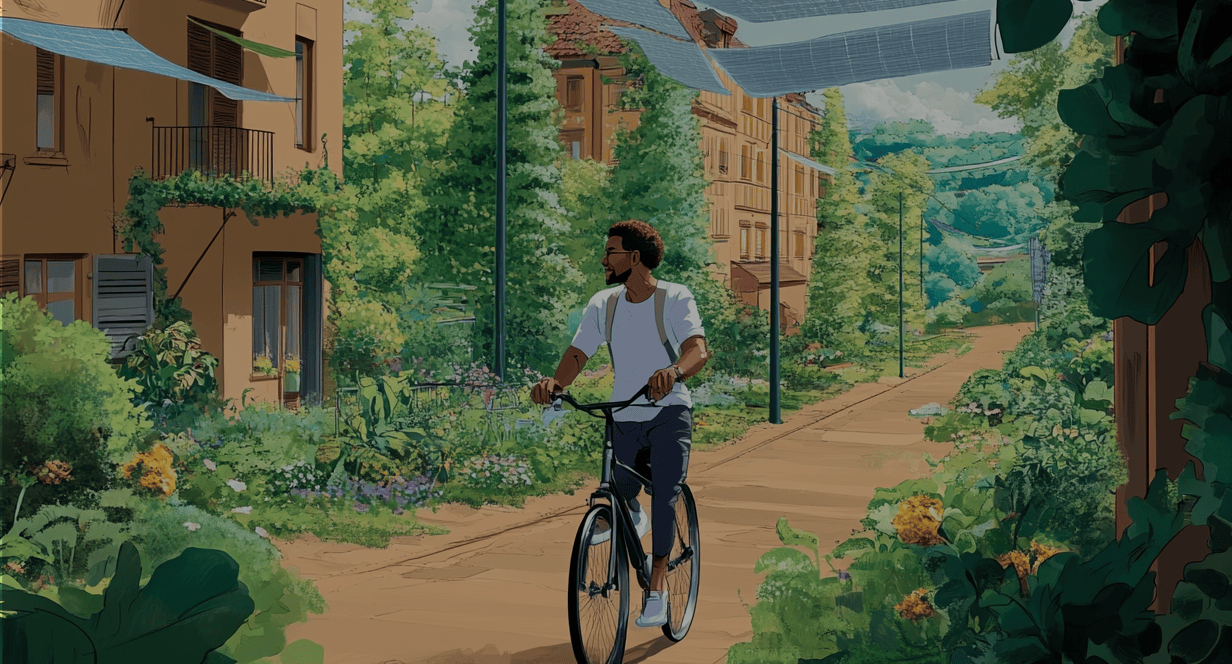
Speculative scenarios
Scenario 1: The Green Guardian
Specifications
- Timeframe: 2050
- Context: In this future, society values eco-friendly lifestyles and community well-being as key indicators of health. Insurance companies offer dynamic health plans linked to individual carbon footprints and lifestyle choices.
Character: Lucie
Lucie, a 43-year-old urban planner living in Zurich, is part of a community of Green Guardians—individuals whose health insurance premiums fluctuate based on their real-time environmental and health behaviour data. Lucie’s home is equipped with renewable energy, smart meters, and a health-monitoring system. She bicycles to work, grows her own food in a community garden, and avoids processed goods.
Her health insurance is directly influenced by her choices:
- Low Carbon Footprint Rewards: Each month, Lucie receives lower premiums due to her reduced energy consumption, organic food choices, and regular cycling, reducing not only her carbon footprint but also her risk of chronic diseases like diabetes and heart disease.
- Community Impact: Lucie’s insurance plan is linked to her entire neighbourhood’s energy consumption. When her community reaches certain sustainability milestones, such as reducing collective emissions by 10%, they all benefit from lower premiums. This incentivizes collective actions like neighbourhood tree planting and waste reduction programs.
The "Lateral Public Health" approach is fully integrated, promoting resilience not just through individual actions but through interconnected social networks. The community thrives on social capital, with people connecting their well-being to each other's health and sustainability behaviours.
Key Insights
- Climate Change Impact: Health insurance systems are designed to reward people for mitigating climate risks through sustainable behaviours.
- Mobility and Transport: Lucie minimizes her carbon emissions by avoiding car usage and benefiting from incentives linked to her electric bike commuting.
- Health and Environment Nexus: Lucie’s life choices reflect how health is no longer about avoiding disease, but about actively contributing to a livable environment.
Scenario 2: The Balanced Professional
Specifications
- Timeframe: 2050
- Context: Health insurance in this scenario is tailored around remote work and mental health as essential factors of well-being, addressing the shift towards flexible working hours and remote jobs. This diverges from the Green Guardian model by focusing more on individual mental and social health instead of environmental factors alone.
Character: Jean-Pierre
Jean-Pierre, a 50-year-old data analyst, works mostly from home in Lausanne, where flexible working hours and remote home offices have become the norm. His insurance plan emphasizes mental health, work-life balance, and social connectivity.
Unlike Lucie, who is deeply engaged with her environment, Jean-Pierre’s insurance premiums are influenced by his mental and social health metrics:
- Remote Work Optimization: His insurance plan offers tailored wellness
programs, covering virtual therapy sessions, meditation apps, and regular
digital check-ins with health coaches. By maintaining his mental health, his
insurance premium is kept low. - Health-Tech Integration: Jean-Pierre’s daily work and lifestyle patterns
are continuously tracked via his health insurance app. Every week, he
receives a health score based on screen time, sleep, and physical activity. His employer encourages him to take regular mental health breaks, offering
a corporate insurance plan that rewards well-rested employees. - Sociability as a Health Metric: To combat the isolation of remote work, Jean-Pierre is rewarded for participating in virtual social clubs and team-building events. His health plan values his social interactions, recognizing that mental health resilience stems from community building as much as physical health.
In this scenario, voluntary immobility and an emphasis on mental health in the face of changing work dynamics become critical insurance metrics. Unlike Lucie’s outward focus on environmental sustainability, Jean-Pierre’s plan is inward-looking, emphasizing personal well-being in the context of a highly connected yet socially distant world.
Key Insights
- Work-Life Balance Focus: With more people working remotely, health insurance shifts from primarily physical health concerns to mental health metrics.
- Health-Tech and Personalization: Technology becomes a crucial aspect of maintaining health, with personalized metrics guiding lifestyle choices.
- Decarbonizing Lifestyle Choices: Jean-Pierre doesn’t use public transport or drive, thus reducing his carbon footprint passively through remote work, contrasting Lucie’s proactive environmental engagement.
Scenario 3: The Climate Resilient Newcomer
Specifications
- Timeframe: 2050
- Context: Switzerland has become a leading example of climate resilience, integrating sustainable infrastructure and health systems that prioritize social and environmental adaptation. The country welcomes climate migrants, providing support through a holistic health insurance model that incentivizes sustainable choices and community integration. François, an immigrant from Cameroon, is part of this new wave of arrivals. His journey reflects the resilience and adaptability of individuals in a world where climate-driven displacement is increasingly common.
Character: François
François is a 32-year-old immigrant who moved to Switzerland from Cameroon two years ago, forced to leave his homeland due to worsening droughts and food scarcity. In Switzerland, he found stable work as an apprentice in sustainable construction, contributing to eco-friendly building projects. His daily life revolves around learning new skills, biking to work to reduce his carbon footprint, and participating in language classes to integrate into the community. François’ health insurance adjusts dynamically based on his lifestyle choices, rewarding sustainable and healthy behaviours that help him adapt to a new environment. He feels a sense of pride and accomplishment as he builds a better future, not only for himself, but also for his community.
Key Insights
- Climate-induced Migration: François’ story highlights the reality of climate-driven migration, as people relocate to adapt to environmental changes and pursue better opportunities.
- Health and Community Resilience: Switzerland’s health insurance system is designed to support immigrants like François by encouraging sustainable behaviours and mental health resilience through social integration.
- Sustainable Urban Living: François' commute and work environment reflect a shift towards decarbonized infrastructure and community-oriented green spaces, promoting lower carbon emissions.
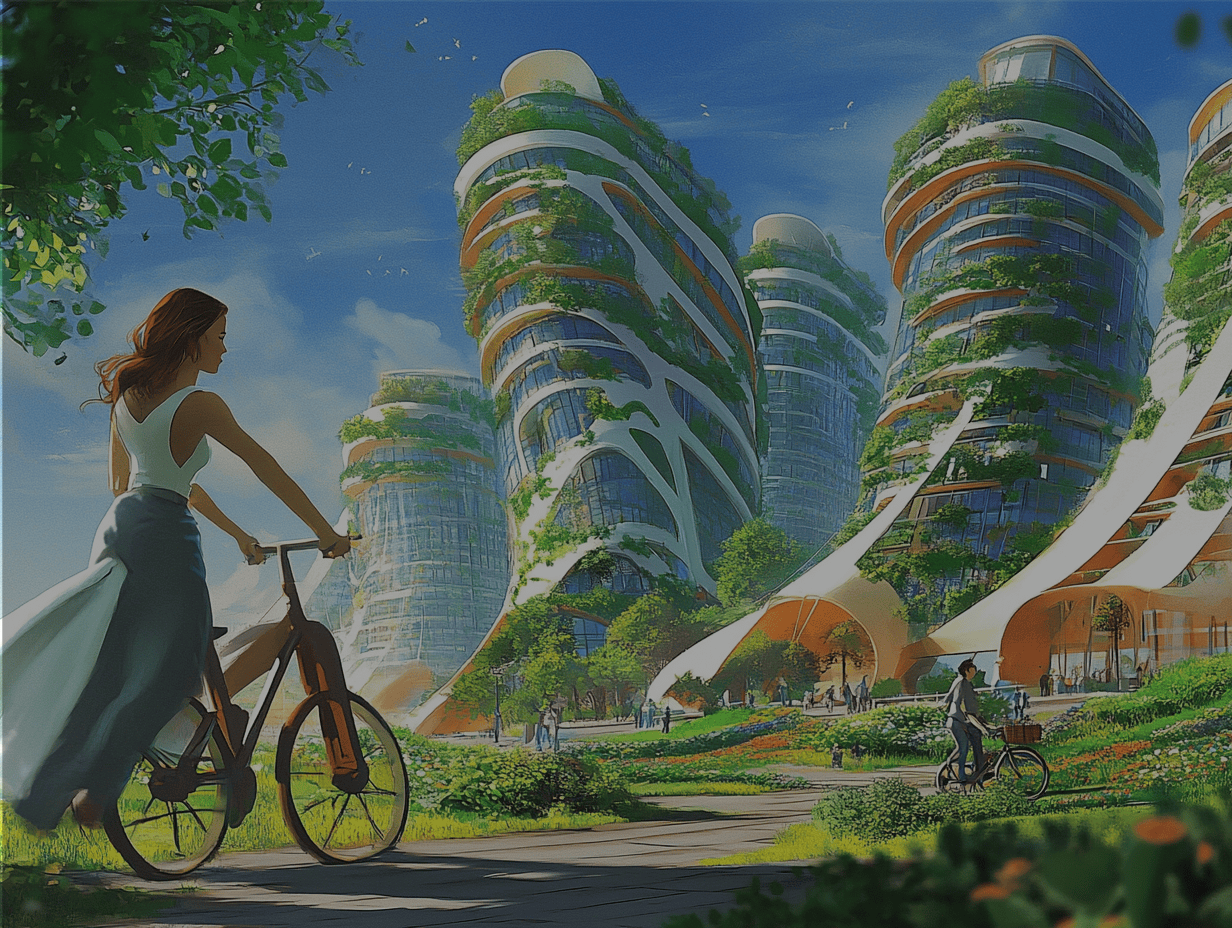
Stories from the future
Lucie’s Day: A Green Guardian in 2050
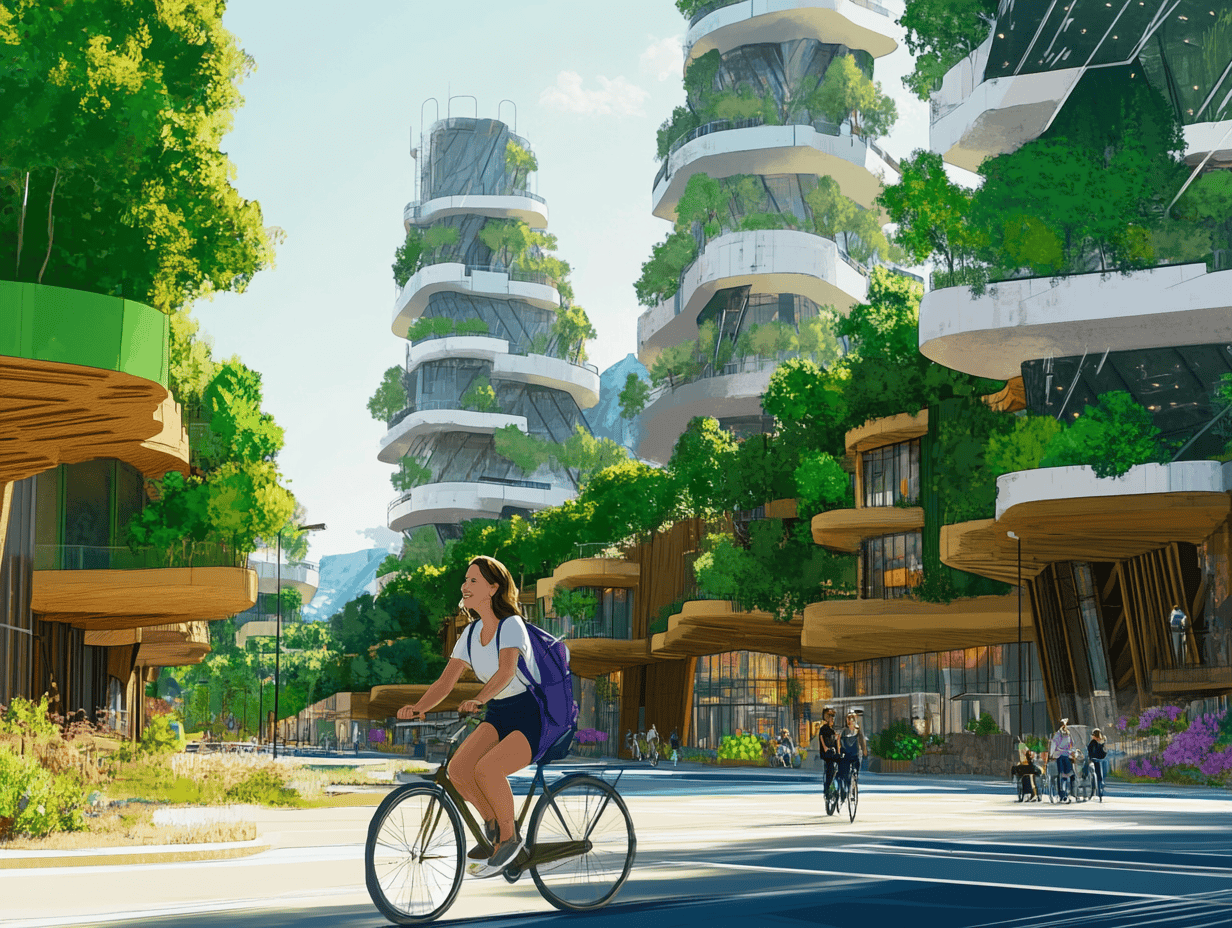
Lucie wakes up early to the soft hum of her home’s environmental sensors adjusting the airflow, ensuring the air quality in her home is optimal. The light filtering through her bedroom window is not just sunlight—it’s a reflection of her solar-powered rooftop, silently generating clean energy. As Lucie stretches, her health app pings softly, displaying her health status and carbon footprint for the week. She smiles—a week of cycling to work, eating organic, and contributing to her community garden has kept her health insurance premiums low.
By 7 AM, Lucie heads out to the community garden. The plants are thriving, not
just because of the care she and her neighbours provide, but because they are part of the local insurance plan. Everyone knows that the better their gardens grow, the healthier the neighbourhood becomes, literally and figuratively. This reduces the carbon footprint and stress, which keeps everyone's premiums manageable.
As she pedals her electric bike to work, she passes other “Green Guardians” on their own bikes or walking. There’s an unspoken camaraderie among them—everyone is part of the same ecosystem. The energy-efficient skyscrapers of Zurich loom ahead, their organic fabric shades stretching between buildings, creating a microclimate that shields pedestrians and cyclists from the heat.
At work, Lucie’s urban planning team is busy preparing designs for a new eco-friendly district. They’ve incorporated smart homes like hers, shared green spaces, and carbon-neutral transport options. Lucie knows that their project will not only provide housing but also help residents lower their insurance costs through sustainable living. Her smartwatch vibrates gently, reminding her it’s time for a quick meditation break—a feature of her insurance plan. She heads to a small rooftop garden, where her company has set up a quiet space for employees to recharge.
Later in the afternoon, she meets with her community’s Green Council. They review the neighbourhood’s carbon metrics and plan the next community-wide event: a tree-planting day. The event not only brings people together, but also ensures that their collective environmental impact stays low, keeping everyone's premiums in check. As Lucie bikes home, the setting sun reflects off the solar-powered streetlights, a subtle reminder of the energy they’ve saved.
That evening, Lucie prepares dinner—locally grown vegetables from the community garden. Her kitchen appliances, all energy-efficient, quietly track their usage, adding to her health report for the day. As she settles into bed, her health app sends her a summary of her day: excellent air quality, reduced energy usage, and a balanced diet. Lucie smiles. Her choices not only benefit her, but the entire community. And in this world, health is not just about individual well-being—it’s about living in harmony with the planet.
Jean-Pierre’s Day: The Balanced Professional in 2050
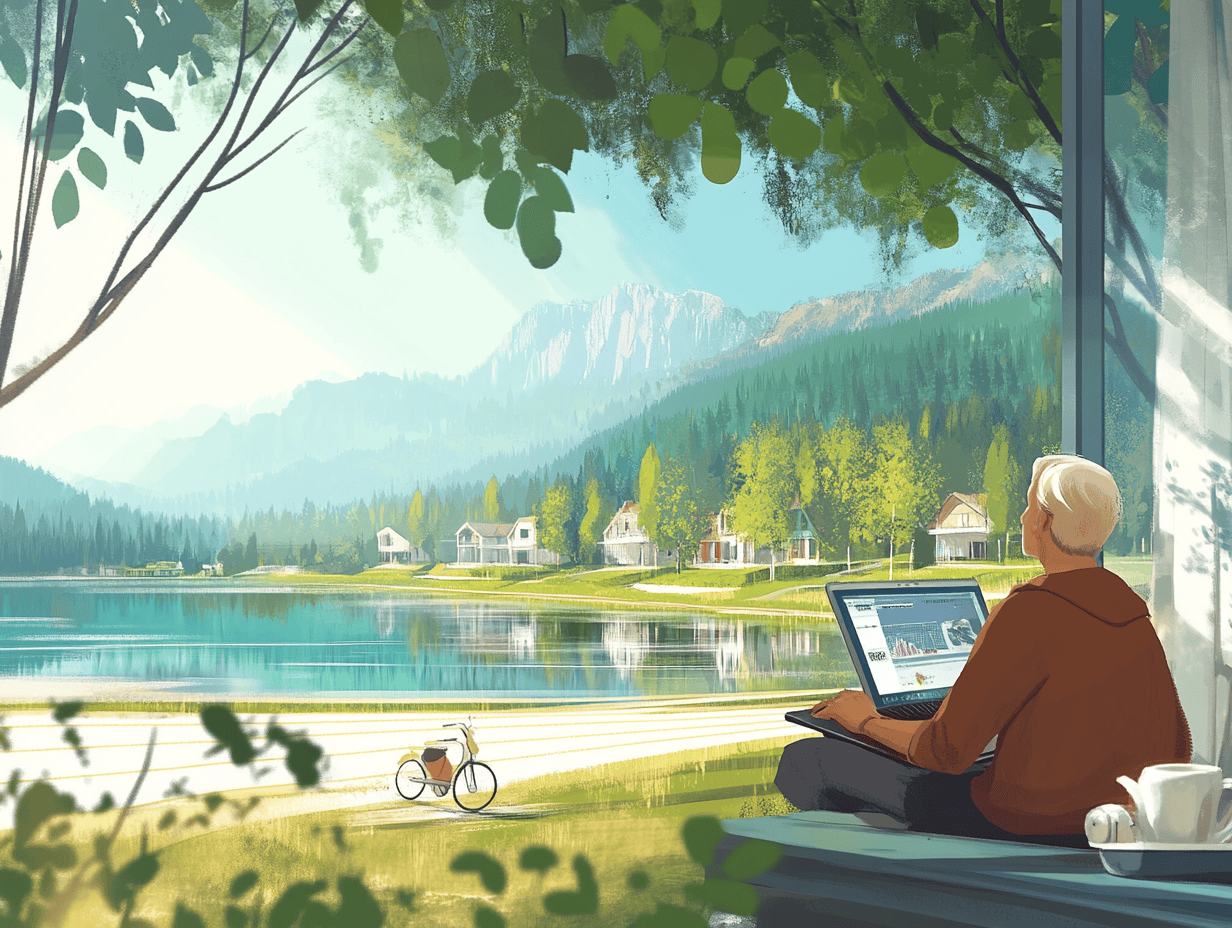
Jean-Pierre’s day begins gently. The smart system in his Lausanne apartment
detects his wakefulness, adjusting the lighting to match the morning sun. His apartment, designed for remote workers, adapts to his preferences automatically: the air is purified, and the temperature is just right. Jean-Pierre glances at his health app, which shows his mental health score—a key metric in his health insurance plan. His sleep was deep, with only a few interruptions, and that means today’s score will help keep his premiums low.
By 8 AM, Jean-Pierre settles into his home office, which overlooks the lake. As a data analyst, he works remotely for a global company, and his health insurance reflects this lifestyle. His app pings with a gentle reminder: “Take a break in 30 minutes.” Jean-Pierre knows that his mental well-being is as important as his physical health, especially since his insurance rewards him for maintaining a healthy work-life balance. Remote work is a blessing for him—it not only allows flexibility but also helps reduce his stress, something his insurance plan actively monitors.
At 10 AM, Jean-Pierre joins his weekly virtual team meeting. His company’s
insurance plan offers mental health support, and part of that involves regular
team-building activities. Today’s meeting ends with a virtual coffee break—
everyone joins a video call just to chat, laugh, and share stories. The insurance
company encourages these social connections, recognizing the role that social health plays in long-term well-being. Jean-Pierre finds it refreshing, and it’s one of the reasons he’s stayed with this company for so long.
After the meeting, Jean-Pierre takes his health app’s advice and goes for a short walk by the lake. His smartwatch tracks his steps, logging them into his daily health report. His insurance rewards him for being active, even in these small ways. The air is crisp, and he notices a few of his neighbours out for walks as well—most of them also work remotely, their health and insurance tied closely to their ability to balance work and life.
Around midday, Jean-Pierre orders lunch—an eco-friendly meal from a local restaurant. His insurance offers discounts for choosing sustainable food options, and he enjoys knowing that his meal has a minimal environmental impact. After lunch, his app reminds him to take a short mindfulness break, part of his company’s wellness program. He lies back for a few minutes, closing his eyes, letting the world fade for just a moment. These mindful moments are integrated into his workday, reducing his stress and keeping his insurance rates low.
In the evening, Jean-Pierre logs off work and joins a virtual cooking class—an
initiative sponsored by his insurance provider to promote mental and physical
wellness. He enjoys learning new recipes and connecting with others remotely, all while benefiting from the social health points his insurance company tracks.
As he prepares for bed, his health app summarizes the day: excellent mental health score, solid social connections, moderate physical activity. Jean-Pierre feels content. His insurance plan, designed around his remote lifestyle, not only protects his health but actively supports his well-being. In this world, health is about more than just fitness—it's about finding balance in a life where work, mental well-being, and social connections are intertwined.
François’ Day: A New Beginning in 2050
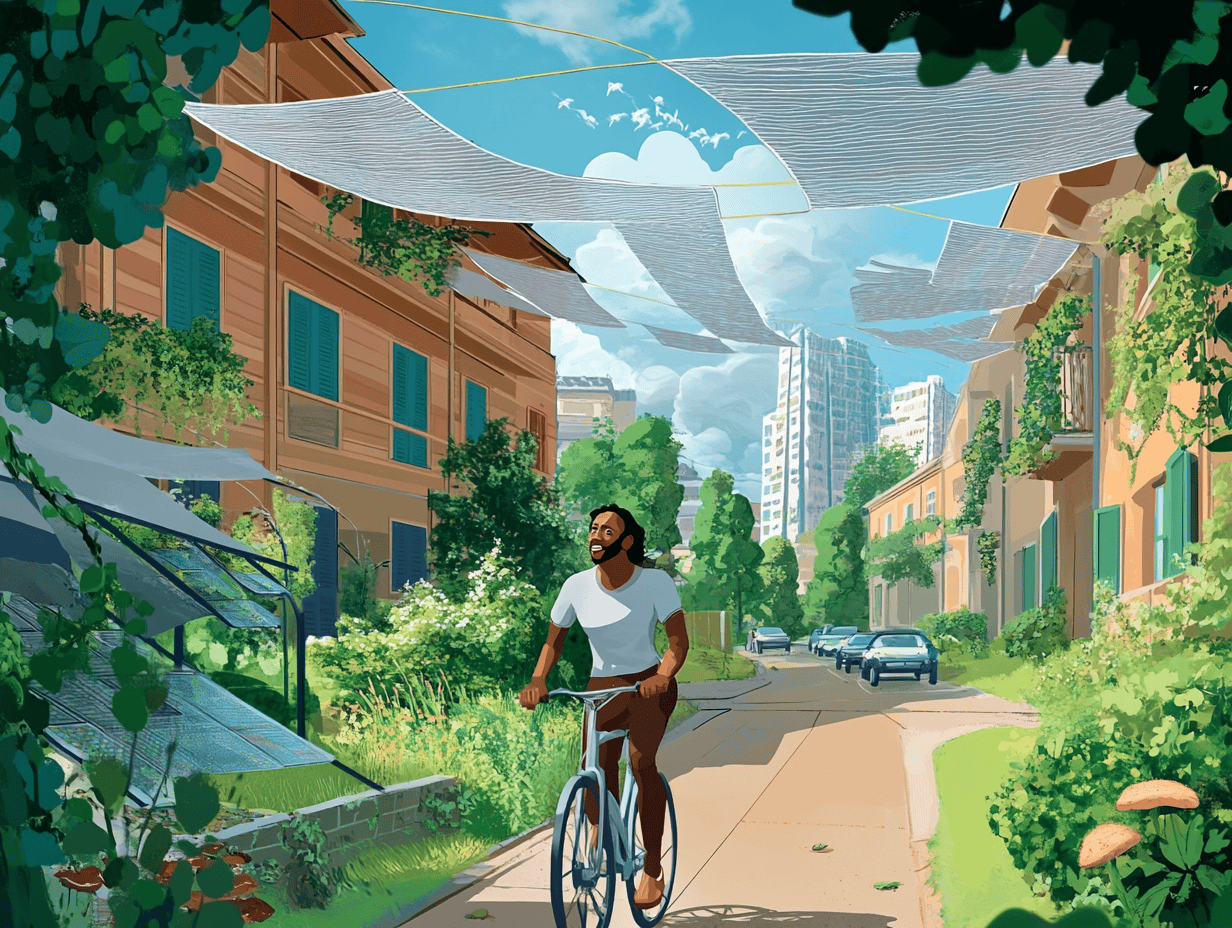
François wakes up in his small but comfortable apartment on the outskirts of
Geneva. The smart blinds rise slowly, letting the natural light filter in. The room adjusts its temperature based on the morning’s weather forecast, which has become increasingly erratic due to climate change. François is still getting used to the colder Swiss winters and unpredictable heat waves, a stark contrast to the climate of his homeland in Cameroon.
Two years ago, François migrated to Switzerland, driven by the environmental degradation in his village, where rising temperatures and prolonged droughts devastated agriculture. Now, as he pulls up his health app, he feels the subtle tension between his past and his present, as his health and life adapt to new realities.
His health app, part of Switzerland's comprehensive dynamic insurance system, tracks everything—from physical activity to his mental well-being, which has become crucial in helping immigrants like François adjust to the stressors of starting a new life in a foreign land. His app reminds him that staying active and making sustainable choices helps lower his insurance premium. Today, François is biking to work, a small action that both reduces his carbon footprint and keeps his premium manageable. The bike ride also serves as a quiet time for him to reflect on his journey—one that started with escaping the climate impacts back home.
At his job site, François works as an apprentice in construction. His company, like many others in Switzerland, follows sustainable building practices. François is particularly proud of how this approach mirrors his work ethic—building something lasting, both physically and metaphorically. Every brick he lays is part of a system designed to withstand climate extremes, from rising sea levels to heat waves. His work also directly impacts his health metrics. The physical labour counts toward his daily health score, tracked through his insurance app. His employer incentivizes sustainable practices, rewarding employees who minimize waste on-site and contribute to eco-friendly initiatives, such as using renewable energy.
As François breaks for lunch, he reflects on how his life in Switzerland is shaped by a global crisis. In Cameroon, he had no choice but to leave due to severe droughts that made farming unsustainable. His family's village, like many others, had become a hotspot for climate-induced migration, with many people displaced by a combination of food insecurity, economic stress, and environmental degradation. Now, in Switzerland, the government’s forward-
thinking policies actively include migrants in health, education, and
employment programs. His health insurance even accounts for his mental
health and well-being as he navigates the challenges of adapting to this new
environment, far from home.
Later in the afternoon, François checks in on his family back in Cameroon via a video call. The droughts in his region have only worsened since he left, and the conversation is tinged with concern. His younger brother asks about the climate in Switzerland, and François explains how the Swiss government is actively tackling climate change—through policies that include decarbonizing transportation and promoting renewable energy sources. It’s a sharp contrast to the environmental devastation at home, but François finds hope in the fact that his health insurance and the Swiss government view climate resilience as part of a broader public health strategy.
In the evening, François heads to his language class, part of a government-funded initiative to help immigrants integrate into Swiss society. His health insurance plan recognizes the importance of social cohesion, and participating in community-building activities like language classes helps lower his premiums. The class is a mix of people from different backgrounds—many of whom, like François, are climate migrants. They share their stories: some fled flooding in Southeast Asia, others escaped desertification in North Africa. This shared experience of climate displacement has forged a tight-knit community.
As François returns home, his health app pings, giving him a summary of his day: physical activity from biking, mental health points from social interactions, and a well-balanced meal, all contributing to his health score. François smiles, feeling a sense of accomplishment. His health is not only improving, but his insurance reflects the proactive steps he’s taking to adjust to life in a climate-conscious Switzerland.
Before bed, François takes a moment to reflect on his journey. The climate crisis has reshaped his life in ways he couldn’t have imagined, but Switzerland’s holistic approach to health and well-being, tied to environmental and social resilience, has given him a fresh start. In this future, health insurance isn’t just about covering medical costs—it’s about empowering individuals and communities to adapt to a changing world. François’ choices, from cycling to learning new skills, are helping to secure his health and his place in this new society. It’s not easy, but every day, he’s building something—just as he’s helping to build the sustainable homes of the future.
Thanks for reading!
Interested in how I could bring new design technics and approaches to your company or project? Let's have a chat! Contact me here or reach out on LinkedIn.
Sources & references
The following sources have been imported and analysed using NotebookLM.
These references helped create plausible futures where health, environment, and personal adaptation are interlinked in the context of a changing world.
- The role of climate change in driving migration and affecting health outcomes, particularly relevant to François' story.
- Decarbonization efforts and sustainable transportation, shaping the urban landscapes in all scenarios.
- Adaptable and resilient health systems that support individuals' physical and mental well-being through personalized and community-oriented policies, essential for all three characters.
- Data-driven approaches to health insurance, integrating technology with lifestyle choices to promote sustainability and wellness, a key theme across all stories.
Human Mobility, Climate Change, and Health: Unpacking the Connections (2020)
This source explores the intersection of climate change, human mobility, and health, emphasizing how climate-induced migration can shape health outcomes. It was relevant to François' story as it highlights the systemic health impacts faced by climate migrants, who must adapt to new environments while navigating health challenges related to displacement and climate risks.
Decarbonising Transport in Europe: Trends, Goals, Policies and Passenger Car Scenarios
This paper provides insights into efforts to reduce carbon emissions in the transport sector through strategies like electrification and biofuels. It was crucial for creating Jean-Pierre's and François' scenarios, showcasing how transport decarbonization and sustainable mobility options, like biking, are integrated into future living environments.
Rebuilding Resilient Health Systems for Europe
This paper discusses the need for health systems that are adaptable and resilient in the face of climate change and other crises. Its insights contributed to all three characters' stories by illustrating how health systems in 2050 could be dynamic, personalized, and connected to sustainable living practices, supporting both physical and mental well-being.
Antifragility of Healthcare Systems in Croatia and Bosnia
The concept of antifragility—systems that improve under stress—was used to imagine Switzerland’s health insurance and healthcare systems, which adapt and become stronger through policies that reward resilience, community engagement, and climate-conscious behaviors. This was particularly relevant for François and Lucie, as their health systems are designed to help individuals adapt to environmental and social changes.
Sustainable and Smart Transport in Europe
This source provided context for sustainable transportation and infrastructure initiatives, such as electric bikes, eco-friendly buildings, and community-driven projects, which were reflected in the urban landscapes in all the scenarios. It helped build a vision of cities that encourage sustainable mobility and support residents' health through urban planning.
IPCC Sixth Assessment Report: Impacts, Adaptation and Vulnerability (2022)
The IPCC report outlines the impacts of climate change on societies and the need for adaptation measures. It was foundational for all the stories, especially in conceptualizing Switzerland as a leader in climate adaptation. François' migration from Cameroon to Switzerland ties into the report's discussion on climate-induced displacement and its social implications.
Health Risks Due to Climate Change: Inequity in Causes and Consequences
This source emphasizes the inequities in health outcomes caused by climate change, affecting those in vulnerable regions more severely. It was relevant to François' backstory, providing context for why he was forced to migrate from Cameroon and how climate change disproportionately impacts less developed countries.
Lateral Public Health: Advancing Systemic Resilience
This source also informed the concept of a public health system that integrates social, environmental, and health factors to build collective resilience. It helped shape Lucie’s community-oriented health insurance system and Jean-Pierre's personalized wellness support, both of which are designed to foster long-term well-being.
Sharing, Synthesis, and Sustainability of Data Analytics in Public Health
This source also contributed insights into how health data can be synthesized to create dynamic insurance models. It informed the stories' portrayal of data-driven health apps that track individual and community health metrics, allowing for tailored insurance plans that adapt to personal lifestyles and collective sustainability goals.
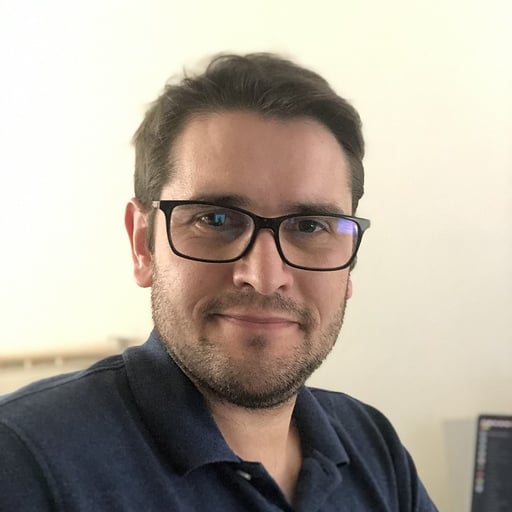
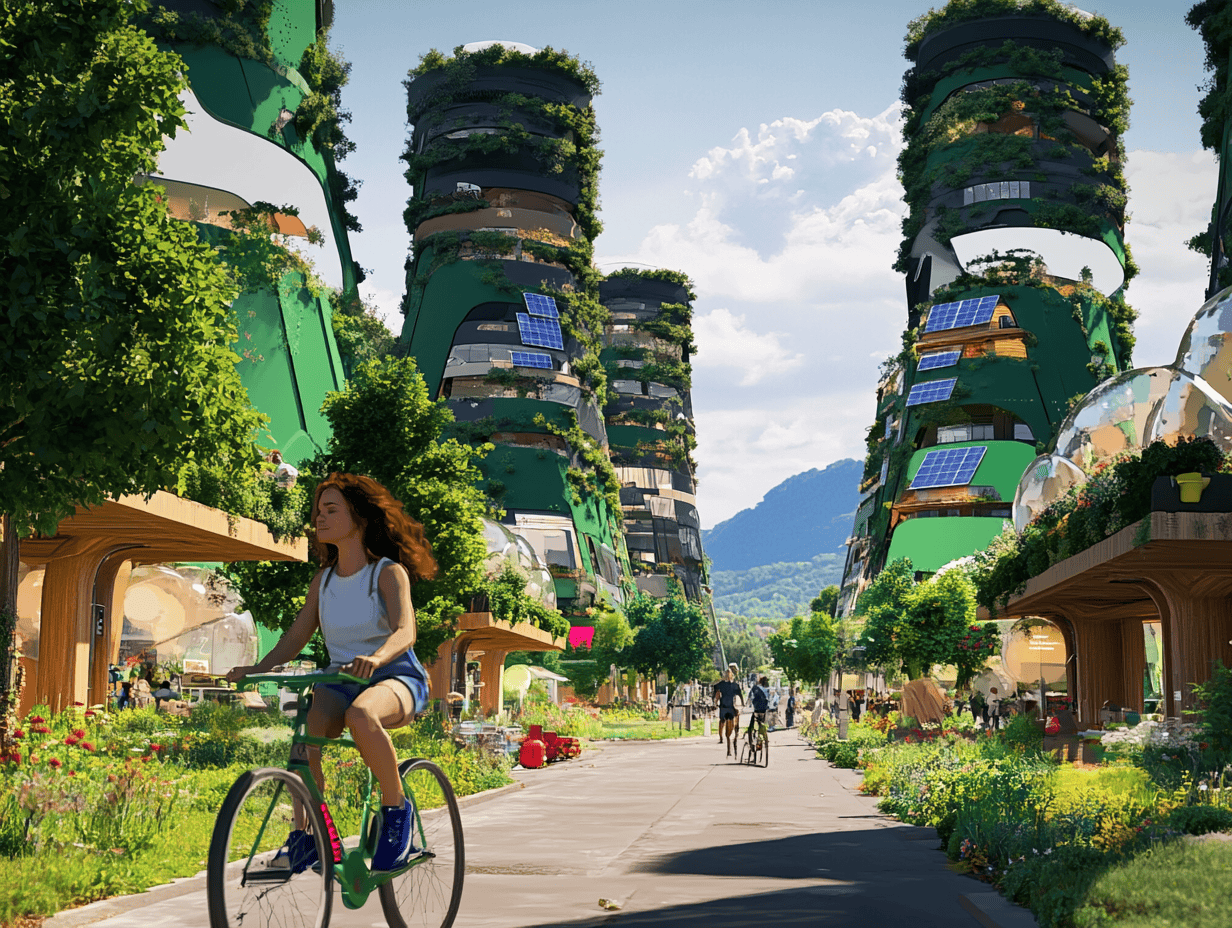
Discussion